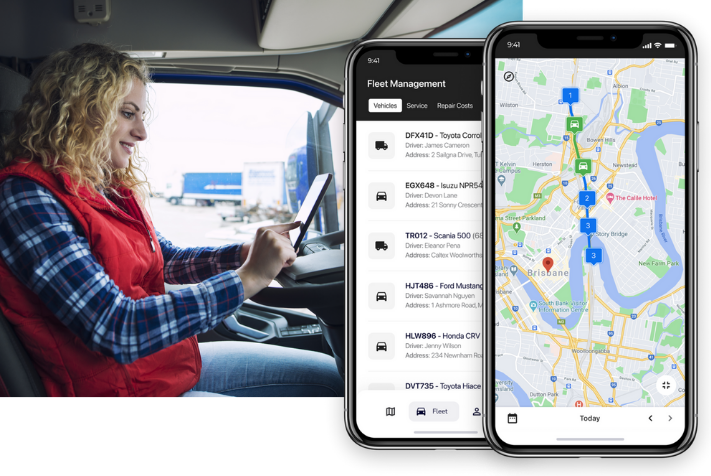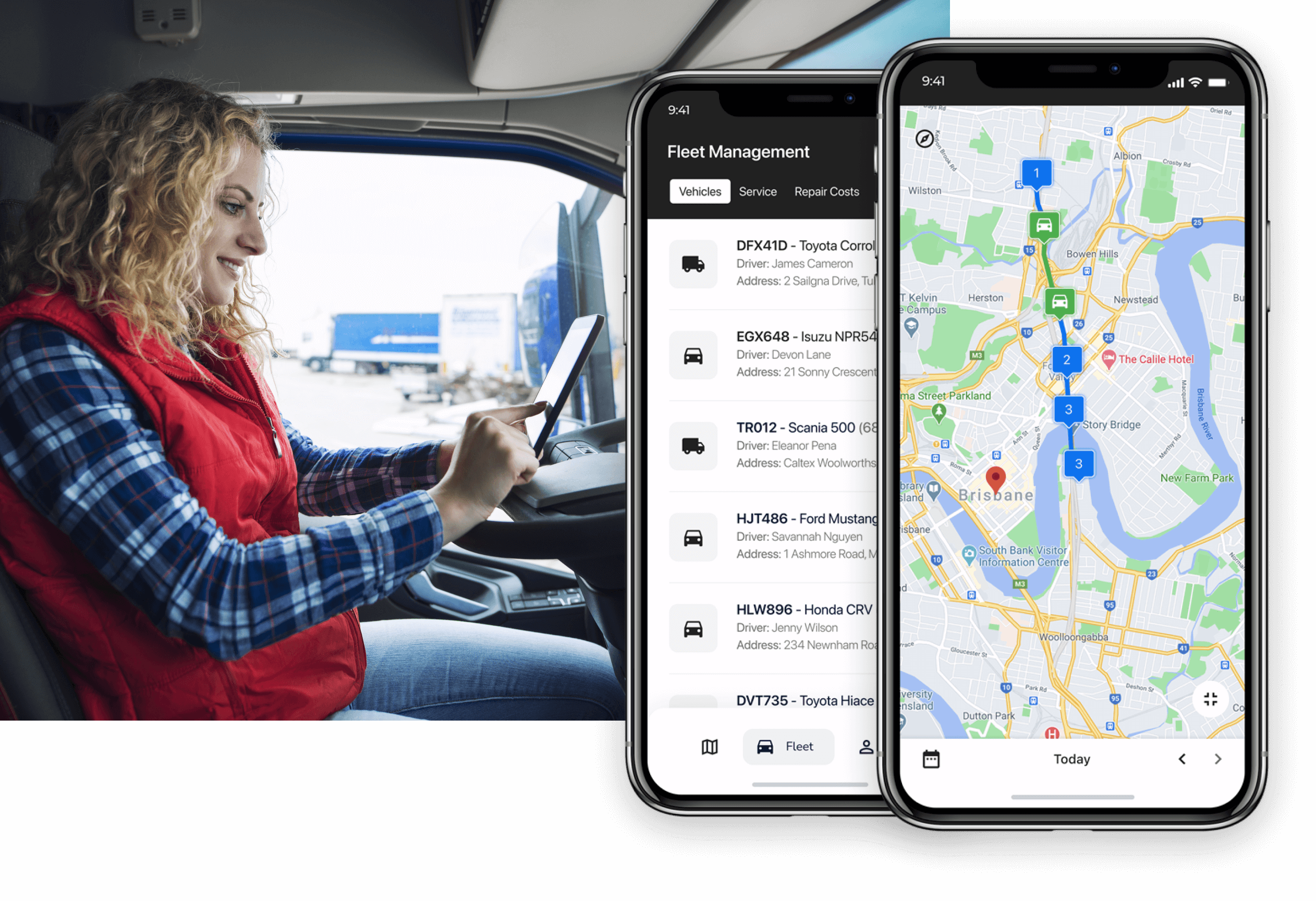Need to keep a watchful eye on your vehicle, assets, or loved ones? GPS tracking provides a vigilant solution. This article explores the ins and outs of GPS tracking systems, unveils their diverse applications, and guides you through selecting a tracking solution tailored to your individual or business needs.
Key takeaways
GPS tracking technology provides real-time location updates, utilized in various applications such as vehicle security, fleet management, asset tracking, and personal safety, enhancing navigation and ensuring peace of mind.
Advanced GPS trackers contain all the features necessary for comprehensive vehicle security and recovery of stolen vehicles, including geofencing, tamper alerts, remote immobilization, and precise location data for quick retrieval, ensuring they meet the specific needs of business managers, parents, and pet trainers with their top-quality materials, sophisticated software, and detailed analytics.
GPS tracking solutions optimize fleet efficiency by monitoring driver behaviour, providing detailed reports for management, and catering to specialized industries, all aimed at improving operational efficiency and asset management.
Navigating the Essentials of GPS Tracking
GPS tracking technology, a pivotal component in contemporary navigation and security systems, has transitioned from military use to becoming an essential element of daily life. These GPS trackers serve as the foundation for services that provide real-time location data, crucial for managing vehicle fleets, protecting valued automobiles or ensuring the safety and well-being of loved ones.
Appreciating the operation and various uses of these compact yet powerful devices can profoundly improve our ability to oversee movements and defend what is most important in our lives.
Understanding GPS Technology
A GPS tracker harnesses the power of satellite technology, offering real-time updates on positioning with remarkable accuracy. This device’s capability is crucial whether it’s for plotting a route in Google Maps during an excursion or pinpointing your vehicle’s precise whereabouts—the sophisticated mechanism behind these devices guarantees you’re armed with exact location data whenever needed.
This fusion of technological ingenuity and convenience makes certain that losing your way becomes virtually impossible. Additionally, GPS technology not only provides exact location data but also generates valuable tracking data that can be used for various purposes.
The Mechanics Behind GPS Tracking Devices
“Exploring the intricacies, GPS tracking devices exemplify significant technological progress by providing real-time tracking along with customized updates for various requirements.”

Consider the AT12S GPS Tracking Device as an example, which is specifically designed for tracking trailers. It is engineered to make the intricate process of trailer tracking more straightforward, offering features like long battery life and protection against unauthorized access and theft, and works seamlessly with fleet management software. The advanced nature of these devices renders the act of monitoring a seamless component in logistics and enhances personal security measures.
Applications of GPS Tracking in Daily Life
GPS tracking serves a multitude of daily purposes, both significant and wide-ranging. These include:
- Maintaining the safety of family members by monitoring their locations
- Keeping track of important assets’ positions
- Overseeing vehicle movement for efficient fleet management
- Locating pets to ensure they are safe
- Aiding in search and rescue missions
- Supplying information for sports and fitness pursuits as well as outdoor adventures
In today’s world, GPS trackers have become an essential component.
The data resulting from tracking is rich in detail, providing specific insights including addresses visited, timing of movements, and velocities travelled. This creates a full narrative on the travel patterns and actions undertaken. GPS tracking also provides valuable insights into asset management, fleet efficiency, and personal safety.
Enhancing Vehicle Security with Advanced GPS Trackers
Utilizing GPS trackers for your vehicle offers a level of security comparable to an always-vigilant personal guard. These devices are equipped with functions that include geofencing, alerts when tampering occurs, and the capability to disable the car remotely – creating a robust shield around your automotive property.
The assurance gained from knowing your vehicle is under constant surveillance and defence by these trackers is invaluable, particularly for the swift recovery of a stolen vehicle. GPS trackers play a crucial role in the recovery process, offering lightning-fast precision and speed in pinpointing the whereabouts of a stolen vehicle for easy retrieval. This is especially true in today’s unpredictable environment where anything can occur without warning.
Real-Time Vehicle Monitoring
GPS trackers are pivotal in enhancing vehicle security through real-time tracking capabilities. They offer comprehensive data, revealing not only the precise location of a vehicle, but also granular information like speed, acceleration patterns, and braking behaviour due to integrated sensors.
Vehicle owners have the flexibility to tailor their monitoring experience by choosing how often they receive updates—ranging from every few minutes onwards—which keeps them continuously informed about their vehicle’s status.
Alerts and Notifications for Peace of Mind
GPS trackers offer much more than mere tracking capabilities. Their true worth is realized through the alerts and notifications that they provide, giving users a sense of tranquillity. With geofencing—a feature of GPS trackers—users can establish virtual borders, which immediately trigger alerts as soon as a vehicle crosses into or out of these set zones.
This forward-looking aspect of vehicle protection gives owners the confidence to relax, secure in the knowledge that their assets are under constant surveillance.
Recovering Stolen Vehicles with GPS Assistance
Should a vehicle be stolen, GPS trackers serve as a crucial resource for its retrieval. These devices provide accurate location data that greatly enhances the ability of law enforcement to promptly locate and recover the stolen asset. Both real-time tracking capabilities and access to historical data offered by these trackers make them an indispensable asset in enabling authorities to swiftly track down and reclaim vehicles.
Maximizing Fleet Efficiency with GPS Tracking Solutions
Businesses dependent on a fleet of vehicles can significantly enhance efficiency and reduce expenses with the implementation of GPS tracking solutions. These systems not only provide precise location tracking, but also facilitate route optimization, fuel consumption monitoring, and supervision of driver conduct for a thorough management strategy.
The impact of this optimization extends throughout the entire business operations. It lowers operational costs and notably improves customer satisfaction by affecting all aspects related to fleet management.
Monitoring Driver Behaviour for Safety and Efficiency
The safety of a fleet is crucial, and monitoring driver behaviour through GPS tracking is key to maintaining it. Fleet managers can use the data collected on instances such as speeding, harsh braking, and rapid acceleration to spot and address dangerous driving habits.
Utilizing real-time traffic data allows for route optimization, which not only boosts road safety but also increases overall efficiency.
Detailed Reports for Better Fleet Management
GPS trackers are fundamental to successful fleet management due to their capacity to produce detailed reports. Such reports grant managers a clear understanding of delivery routes, total distance travelled, and engine operation times for the entire fleet, thus allowing them to make knowledgeable choices and precisely manage all vehicles within the fleet.
The Role of GPS Tracking in Industries and Beyond
Tracking solutions utilizing GPS technology are essential beyond the logistics industry, and hold significant importance in specialized fields like the gas sector. The AT12 Asset Tracker is an example of a device that utilizes the Telstra network to cater to these industry-specific needs, enhancing security measures as well as operational navigation and efficiency.
The contribution of reliable GPS tracking systems to such sectors is paramount. They offer critical support in overseeing assets with meticulous attention, ensuring their precise management and protection.
Asset Tracking Made Simple with GPS Technology
GPS technology has revolutionized the intricacies of managing assets by providing real-time location data and adaptable options, enabling companies to monitor their valuable assets with precision no matter their geographic position.
As a vital component in contemporary asset management, the flexibility and efficacy of GPS tracking systems cannot be overstated.
Key Features of Asset Tracking Devices
Asset tracking devices are engineered to prioritize durability and effectiveness, encompassing all the essential features required for proficient asset management. These devices boast an improved battery life coupled with optimized power consumption, facilitating uninterrupted monitoring and tracking of assets over prolonged durations.
To this, the versatility of these trackers provides a customized solution for asset management by accommodating the specific requirements of various types of assets.
Real-Time Updates and Historical Data Access
Receiving updates in real time and accessing historical data significantly transforms the process of asset tracking. With GPS technology, individuals are equipped with precise maps and immediate information that grant full visibility over assets for effective control and management.
When choosing a tracker, it is essential to take into account aspects such as range and battery life since they have a direct influence on how accurate and reliable the provided updates and data will be.
Tailored Tracking Solutions for Various Asset Types
Tracking solutions using GPS technology are designed to meet the diverse needs of various assets, providing security and simplicity in locating each asset. Whether it’s durable, water-resistant trackers for pets or wearable devices equipped with health monitoring capabilities for kids, these tracking systems are customized to address distinct asset specifications.
GPS-enabled tags and sensors also play a crucial role in environmental conservation by facilitating the tracking of wildlife and analyzing their migration behaviours.
Installation and Setup: Making GPS Tracking User-Friendly
GPS tracker technology is engineered for ease of use, accommodating the requirements of both fixed vehicle tracking and mobile personal monitoring. The setup process— from connecting a tracker to a car’s electrical system to configuring portable devices—is clear-cut and user-friendly.
It’s vital that drivers are well-informed and receive technical support in order to ensure seamless integration and adoption of these GPS trackers.
Installing Vehicle-Specific GPS Trackers
Easy installation of GPS trackers for vehicles is possible through convenient solutions such as the OBD II port, eliminating the necessity for complex professional hardwiring. These GPS devices offer not only precise location tracking but also afford insights into crucial vehicle diagnostic data, presenting an all-encompassing approach to vehicle supervision.
Configuring Portable GPS Trackers for Personal Use
To set up portable GPS trackers for personal use, one should:
- Synchronize the device with a smartphone application to enable real-time tracking.
- Securely fasten the tracker to individual belongings discreetly for their protection.
- Configure functionalities such as ‘safe zones’ and emergency SOS alerts for family members or friends.
- Employ geo-fencing capabilities to safeguard personal possessions.
Integrating GPS Trackers with Smartphone and Computer Software
The use of GPS trackers in conjunction with computer and smartphone software enhances the capability to oversee and manage assets effectively. The adoption of mobile apps and cloud technology allows users to remotely access and control their tracking devices, ensuring a smooth operation in monitoring their assets.
Responsive customer service alongside a robust warranty policy is critical, playing an indispensable role in tackling any operational issues that may arise with the use of GPS trackers.
Choosing the Right GPS Tracker for Your Needs
When selecting an appropriate GPS tracker, it is crucial to consider various elements such as:
- The precision of the tracking
- Price considerations
- Range of coverage area
- Customer service following the purchase
It is vital to have a well-defined notion of your particular needs and what functionalities will effectively address them. Whether you are monitoring a car, keeping tabs on someone important or safeguarding personal belongings, taking into account these aspects helps guarantee that the device selected aligns perfectly with your requirements.
Factors to Consider When Buying a GPS Tracker
When purchasing a GPS tracker, one should take into account several key considerations.
- The purpose for which it will be used
- It’s level of accuracy
- Dependability
- Price point
- The scope of its service area
These elements are pivotal in ascertaining the tracker’s capability to furnish tranquillity and fulfil your tracking requisites while adhering to financial constraints.
Professionals can assist you in selecting a GPS tracker optimally suited to your demands, whether that entails placing emphasis on accuracy in GPS or necessitating an extensive range of coverage.
Comparing Different Types of GPS Trackers
Evaluating various GPS tracker models is crucial for selecting the appropriate one that meets your tracking needs. For example, portable trackers are available in configurations like watches and pendants, affecting their appropriateness for specific uses such as ensuring personal safety or overseeing asset tracking.
Contacting Experts for Personalized Recommendations
Seeking guidance from professionals skilled in GPS tracking solutions can offer critical knowledge, guaranteeing the selection of a dependable tracker suited to your individual needs. Organizations such as The Spy Store boast approachable customer service teams who are ready to help you pinpoint the most suitable GPS tracking device for your particular situation.
Conclusion
As our exploration of GPS tracking technology concludes, it’s clear that whether for personal safety, asset management, or enhancing business operations, the right tracking solutions can make a world of difference. With tailored features for every need, user-friendly installation, and expert guidance available, navigating the options is as straightforward as GPS itself. Let this technology guide you to a more secure and efficient tomorrow.
FAQs
1. How does GPS tracking benefit businesses in Australia?
GPS tracking enables businesses to monitor assets, optimize logistics, and enhance employee safety, leading to improved efficiency and productivity.
2. Are there any legal restrictions on GPS tracking in Australia?
Yes, businesses must comply with privacy laws and data protection regulations when implementing GPS tracking solutions in Australia.
3. What are some common applications of GPS tracking for Australian businesses?
GPS tracking is commonly used for fleet management, asset protection, and employee safety across various industries in Australia, including transportation, construction, and mining.
4. How can businesses ensure the ethical use of GPS tracking devices?
Businesses should prioritize transparency, consent, and data security when implementing GPS tracking, ensuring respect for individuals’ privacy rights and ethical considerations.
5. What are the key considerations for selecting a GPS tracking solution in Australia?
When choosing a GPS tracking solution, businesses should evaluate factors such as accuracy, reliability, scalability, and compatibility with existing systems to meet their specific needs and objectives.





